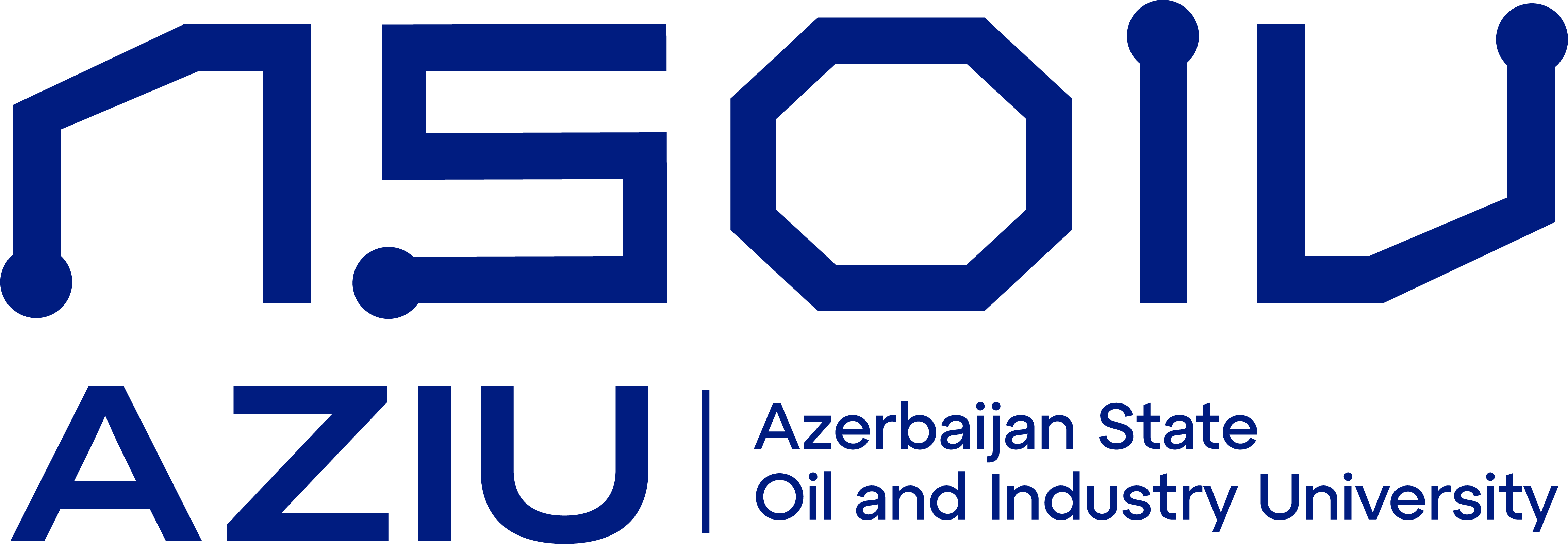
Azərbaycan Dövlət
Neft və Sənaye
Universiteti
1.1. Azərbaycan Dövlət Neft və Sənaye Universiteti PHŞ-nin (bundan sonra ADNSU) Kitabxana İnformasiya Mərkəzindən (bundan sonra Kitabxana İnformasiya Mərkəzi) istifadə qaydaları Azərbaycan Respublikası Nazirlər Kabinetinin 05 iyul 2016-cı il tarixli 266 nömrəli qərarı ilə təsdiq olunmuş “Ali təhsil müəssisəsinin kitabxanasının Nümunəvi Əsasnaməsi” əsasında hazırlanmışdır.
1.2. Kitabxana İnformasiya Mərkəzindən İstifadə qaydaları ADNSU-nun oxuculara təqdim etdiyi xidmətlərin ümumi prosedurlarını tənzimləyir.
1.3. Kitabxana İnformasiya Mərkəzi çap əsərlərindən və digər informasiya daşıyıcılarından səmərəli istifadə olunması məqsədi ilə kompleks kitabxana, biblioqrafiya və informasiya xidmətləri göstərir.
1.4. Bu xidmətlər oxucuları ədəbiyyat və informasiya ilə təmin etmək, informasiya daşıyıcılarının seçilməsində onlara kömək göstərmək məqsədini daşıyır.
1.5. Kitabxana İnformasiya Mərkəzinin vəzifəsi kitabxana sərvətlərinin, dünya ədəbiyyatı nümunələrinin etibarlı şəkildə toplanılmasından, qorunaraq gələcək nəsillərə çatdırılmasından, onların oxucular arasında geniş təbliğindən, bəşəri dəyərlərə yiyələnən, müstəqil və yaradıcı düşünən vətəndaşların yetişdirilməsinə fəal yardım etməkdən ibarətdir.
1.6. Kitabxana İnformasiya Mərkəzinin fondunda olan çap əsərlərindən və digər informasiya daşıyıcılarından oxu zallarında və oxu zallarından kənarda faydalanmaq mümkündür.
2.1. Kitabxana İnformasiya Mərkəzinin təqdim etdiyi xidmətlərdən faydalanmaq istəyən oxucular qeydiyyatdan keçməlidir.
2.2. Oxucular Kitabxana İnformasiya Mərkəzində qeydiyyatdan keçdikdən sonra çap əsərləri və digər informasiya daşıyıcılarını sistem vasitəsilə sifariş edə və onlardan faydalana bilərlər.
2.3. Oxucular şəxsi profilində sifariş etdiyi çap əsərinin adını, müəllifini və çap əsərindən istifadə edəcəyi məkanı (oxucu zalı və ya abonement) qeyd etməlidir.
2.4. Oxucuya təqdim olunan çap əsərinin barkodu xüsusi qurğu vasitəsilə oxunur və bu barədə məlumat oxucunun şəxsi profilində əks etdirilir.
2.5. Oxucular çap əsərlərini elektron sifarişdə qeyd olunan müddət ərzində qaytarmalıdır.
3.1. Çap əsərlərindən və digər informasiya daşıyıcılarından oxu zallarından kənarda istifadə etmək istəyən oxucular çap əsərlərindən aşağıdakı müddət ərzində faydalana bilərlər:
3.1.1. bakalavriat təhsil pilləsində təhsilalanlar – 14 günə qədər;
3.1.2. magistratura təhsil pilləsində təhsilalanlar – 21 günə qədər;
3.1.3. doktorantura təhsil pilləsində təhsilalanlar – 28 günə qədər;
3.1.4. ADNSU-nun əməkdaşları – 31 günə qədər;
3.2. Çap əsərlərindən istifadə müddətinin son günü qeyri-iş gününə düşərsə, ondan sonrakı iş günü müddətin qurtarma günü hesab olunur.
3.3. Çap əsərləri və digər informasiya daşıyıcıları oxucular tərəfindən götürülərkən Kitabxana İnformasiya Mərkəzinin əməkdaşına tələbə bileti və ya ADNSU-nun iş vəsiqəsi təqdim olunmalıdır.
3.4. Çap əsərləri və və digər informasiya daşıyıcıları sifariş verildiyi müddətdə qaytarılmadığı təqdirdə hər keçən günə görə oxucu çap əsərinin ümumi dəyərinin 10 (on) faizi miqdarında cərimə ödəyir.
3.5. Oxu zalında istifadə ediləcək çap əsərləri maksimum 8 saat ərzində sifariş edilə və istifadə edilə bilər.
3.6. Çap əsərinin Kitabxana İnformasiya Mərkəzinin əməkdaşına təhvil verilmə müddətinin hər “90 dəqiqə gecikmə intervalına” və itirilən kitaba görə oxucu çap əsərinin ümumi dəyərinin 10 (on) faizi miqdarında cərimə ödəyir.
3.7. Çap əsərlərini və digər informasiya daşıyıcılarını qaytarmayan və cəriməni ödəməyən tələbələrə kitab verilişi müvəqqəti dayandırılacaqdır.
3.8. Elektron kitablarının və digər resursların istifadəsi Kitabxana İnformasiya Mərkəzinin qeydiyyatından keçən oxucuları üçün mümkündür.
4.1.Tələbələr, doktorantlar, ADNSU-nun professor-müəllim heyəti və əməkdaşları Kitabxana İnformasiya Mərkəzinin aşağıdakı xidmətlərindən istifadə etmək hüququna malikdirlər:
• Oxu zalında müvəqqəti istifadə üçün Kitabxana İnformasiya Mərkəzinin fondundan olan çap əsərlərindən və digər informasiya daşıyıcılarından istifadə etmək;
• Ədəbiyyat seçimində, məlumat axtarışında Kitabxana İnformasiya Mərkəzinin əməkdaşlarından məsləhət almaq;
• Kitabxana İnformasiya Mərkəzinin fondundan, soraq-biblioqrafiya aparatından, məlumat mənbələrinin axtarışına və əldə edilməsinə dair məsləhət xidmətindən istifadə etmək;
• Oxu zallarında olan nəşrləri və informasiya resurslarını əldə etmək və onlardan istifadə etmək;
• Kitabxana İnformasiya Mərkəzinin keçirdiyi tədbirlərdə könüllü iştirak etmək.
• Kitabxana İnformasiya Mərkəzindən alınmış çap əsərləri və digər informasiya daşıyıcıları ilə səliqəli davranılmalıdır;
• ADNSU-nun əməkdaşları və tələbələri tərəfindən Azİİ e Kitab Evinin fondundan alınan çap əsərləri Kitabxana İnformasiya Mərkəzinə qaytarılmayana qədər onların elektron qeydiyyatları aparılmayacaq;
• ADNSU-nun hər bir tələbəsi və əməkdaşı onların adına qeydiyyata alınan çap əsərlərinə görə məsuliyyət daşıyırlar və həmin çap əsərlərini başqa tələbəyə və əməkdaşa verə bilməzlər;
• Çap əsərləri və digər informasiya daşıyıcıları bu qaydalarla müəyyən olunmuş müddətdə qaytarılmalıdır;
• Oxu zallarında istifadəsi nəzərdə tutulmuş çap əsərləri və digər informasiya daşıyıcıları oxu zallarından kənara çıxarılmamalı, oxucuların özü ilə aparılmamalıdır;
• Çap əsərlərində və digər informasiya daşıyıcılarında qeydlər aparılmamalıdır;
• Çap əsərlərinin və digər materialların səhifələri çıxarılmamalı və ya qatlanmamalıdır;
• Oxu zallarında sakitliyə riayət edilməlidir;
• Oxu zallarına adi sudan başqa digər içkilər və qida ilə daxil olmaq olmaz;
• Kitabxana İnformasiya Mərkəzində və ona yaxın ərazidə siqaret çəkmək olmaz;
• Oxu zallarına daxil olarkən oxucular üst paltarlarını qarderoba təhvil verməlidir;
• Oxucu oxu zalına daxil olarkən tələbə bileti ilə Kitabxana İnformasiya Mərkəzinin əməkdaşına yaxınlaşdıqdan sonra təyin olunan yerdə əyləşir. Kitabxana İnformasiya Mərkəzinə daxil olarkən boş yerlər monitorda əks olunur;
• Oxu zalına daxil olanda mobil cihazlardan səssiz rejimdə istifadə edilməlidir;
• Müvəqqəti istifadə üçün verilən çap əsərlərinə və informasiya resurslarına qayğı ilə yanaşılmalı, onların yararsız hala salınmasına və ya itirilməsinə yol verilməməlidir;
• Oxucular çap əsərlərini və informasiya resurslarını qəbul edərkən, onların qüsursuz olmasına əmin olmalı və hər hansı bir nöqsan aşkar etdikdə, bu haqda dərhal Mərkəzin əməkdaşlarına məlumat verməlidir, əks halda, çap əsərindən sonuncu istifadə etmiş oxucu qüsurlara görə məsuliyyət daşıyır;
• Avtoreferat, dissertasiya, jurnallar, ardı davam edən nəşrlər (elmi məcmuələr, ADNSU-nun xəbərləri, konfrans materialları) ilə yalnız oxu zallarında tanış olmaq mümkündür;
• “Kitabxana işi haqqında” Azərbaycan Respublikası Qanununun 19-cu maddəsinə əsasən, oxuculardan itirilmiş və ya yararsız vəziyyətə salınmış kitabxananın fonduna məxsus çap əsərlərinin və digər materialların müvafiq çap əsərləri və materiallarla əvəz edilməli, bu mümkün olmadıqda, vurulmuş ziyana görə yeni qiymətləndirmə əmsalları nəzərə alınmaqla onların qiymətinin 10 misli məbləğində vəsait ödənilməlidir. Çap əsərlərinə və digər materiallara vurulan zərərin əvəzi hesablanarkən nəşr olunma illərindən asılı olaraq “Kitabların və digər çap məhsullarının yeni qiymətləndirmə əmsalları nəzərə alınmaqla son qiymətlərinin müəyyən olunma qaydalarında” nəzərdə tutulan düsturlar tətbiq olunur;
• Kitabxana İnformasiya Mərkəzinin fonduna və ya oxuculara təhlükə yaradan və göstərilən qaydalara əməl etməyən istənilən oxucu Mərkəzin əməkdaşı tərəfindən ərazidən uzaqlaşdırılacaq.
